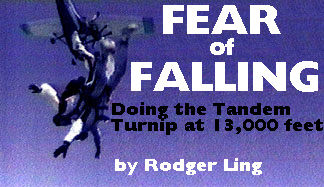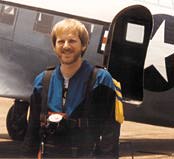
The DC-3 drones through the air two and a half miles above Tullahoma. I'm sitting in a narrow metal seat facing the aisle, crammed in just behind the pilots with half dozen other passengers. In the cabin behind us are at least thirty more people. All of them are wearing parachutes. "We're there!" Ken exclaims. "We are there!" A crack accountant from Erlanger Hospital, Ken is normally a rather low-key kind of guy, but today he's just a little bit excited. Coming here today was his idea, and he's justly proud of it.
We've filled out a half dozen forms in an attempt to abandon our legal rights. We've watched videos, looked at diagrams on a chalkboard, practiced arching our backs and throwing our hips forward, been issued jumpsuits and leather helmets and goggles. We've long since hugged and kissed our respective spouses goodbye, tried to make small talk over the din of the engines, and occasionally paused to think about what we're about to do. It's a sunny day in June, and the only people left on this plane by the time it lands will be the two men flying it.

"First time?" a tall, black-haired girl shouts in my direction. She's pretty enough in her pink jumpsuit to be in the movies, but today she'll be making movies herself with the video camera strapped to her helmet.
"How could you tell?" I shout back. Ken and I look at our watches. It has taken almost 30 minutes for Mr. Douglas (like all truly noble craft, the airplane has a name) to climb into position, but we're almost there. Each of us is tethered to an instructor from Tennessee Skydiving Center. I'm with Denny, a professional who's probably, I figure, made many thousands of jumps. He's been with us most of the morning, telling our group of eight would-be tandem skydivers what to expect in a sort of ground school for complete novices. But that's the beauty of making a tandem jump: you get the experience of skydiving while leaving the responsibility for survival to someone else.
"By the way," Denny tells me, "we're all real experienced doing this kind of stuff, just in case you were wondering."

We walk hunched over, tethered in pairs like prisoners on a chain gang, moving ever closer to a bright opening at the rear of the plane. With every passing second, the plane grows more empty. Standing at the rear of the plane, next to the door, is a tall instructor named Chris and a young blonde girl about to make her first tandem. Her hand is clutched tight in his as they watch bodies disappear into space, one after another.
We step forward, until inevitably I am in front of that open doorway, the sound of the wind around me. This is the naked moment that everyone who ever contemplates skydiving thinks about. To stay or to go: That is the question. While there is every reason in the world to believe the parachute will open, there's a little voice in everyone that keeps whispering to the contrary. Somehow--and I'm not sure if this is always such a great thing--I usually have the ability to squelch that little voice.
Besides, I know I'm going to jump. I’m strapped into a roller coaster, we’re at the top of the big hill, and there’s no sense trying to get off now. There’s no sense even thinking about what's to come. The ground that holds everything I’ve ever known in life is so far away it doesn't exist. In front of me is another world of sunlight and space, an ocean of sky waiting for me to dive in.
"One," Denny yells. "Two!" he bellows, rocking us forward. "Arch!" he says, and we go forward again.

We are outside. The plane is gone, forgotten. There is no sensation of falling. Instead we are floating, flying on rushing air. Denny has predicted that it will take my brain two or three seconds to understand what is happening. Some people never come out of it, doing what Denny calls "the turnip," falling limp through the air. To prevent this, he's given me a series of tasks to perform. As soon as I my brain will allow, I'm to orient myself by looking at the ground, then at the altimeter strapped by my chest, and shouting out the altitude.
I want to do this, but something is wrong. My body is fighting the air, buffeting up and down against Denny. I know I'm doing something wrong, but I can't understand what. I'm arching so hard my back hurts. I'm going to be a turnip for sure. Finally Denny gets his feet around my ankles and pulls my legs up, bending my knees, and we're stable at last. I look at the ground. I look at the altimeter. "Ten thousand!" I shout.
My next task is a practice ripcord pull. I'm supposed to wave my arms, look down at the ripcord and put my hand on it as if to pull. This I manage to do, and finally I'm done with my tasks. The ground hasn't come any closer yet; we're still floating in rushing space. Denny reaches around the pulls my arms to the right. The ground spins below us. The pulls my arms to the left, and we spin another 360 degrees in that direction. Then he points to the altimeter, which reads 6,000 feet. We're falling at 120 miles per hour, 176 feet a second. Every six seconds we cover a thousand feet.
At 5,000 feet I put my right hand on the ripcord without taking my eyes off the altimeter, waiting. At exactly 4,500, I pull and hang on, my single thought being not to let go of the cord. The ripcord is simply a three foot section of steel cable with a handle on one end, and students occasionally throw it out into space. A replacement ripcord will cost you $20.
There is no shock as the chute opens, only a quick pull upwards. Suddenly it's absolutely quiet. The ground is still very far away. We are hanging still in the air, flying along as if in an airplane, and it seems like we'll be able to stay up forever.
But there are more tasks to perform. I stow the ripcord, then reach up to take the steering straps that now hang by my shoulders. "Pull right," Denny says, and we turn sharply to the right. "Let's practice the landing," he says, "pull both arms straight down by your body and lift your legs up." I pull down, and the parachute stalls. We swing back and forth under the canopy. We do this several times as the ground begins, finally, to come closer.

"See how the word "skydive" is mowed into the grass?" Denny says. "We're going to land right in the middle of it." He takes the controls, turning in a classic box-shaped pattern. We're on final approach, heading straight in, the ground coming up fast. I know not to look down at it, but to keep looking ahead so that the ground will come up into my peripheral vision. I know that if I look straight down I'll lose that perspective. Properly executed, a landing should be no harsher than stepping off an escalator. Done wrong, it can hurt. I can't help but remember watching a video of Calvin Sneed, a local reporter who took a tandem jump for the cameras and ended up with a broken ankle.
Contrary to everything reason tells me, I look straight down at the ground, immediately losing track of where we are. I remember what happened to Calvin Sneed and pull my legs higher, too high to be of any use on the landing. "Flare!" Denny says, and I pull my arms down to stall the chute. I hit the ground, tumbling forward with arms outstretched as Denny keeps his feet and shuffles forward over me. It's a clumsy, inglorious landing, but I don't really care. Annie comes over and gives me a kiss. Despite my landing, I'm proud. I didn't break my ankle, become a turnip, or even lose the ripcord.
I am on the ground. I am happy.

Mr. Douglas lifts off with another load of fifty skydivers and quickly disappears. We hear the sound, but even this huge mass of a plane is lost in the expanse of sky. Just as they become visible, a tightly-paced formation of skydivers breaks apart like fireworks exploding, and parachutes begin to pop open far above. Soon the air is filled with flying colors as dozens of parachutes drop around us from all directions.
Ken and I look at each other and grin.
Water | Caving | Hang Gliding | Backpacking | About

Copyright © 1996-2013 by Rodger Ling.
All rights reserved.
